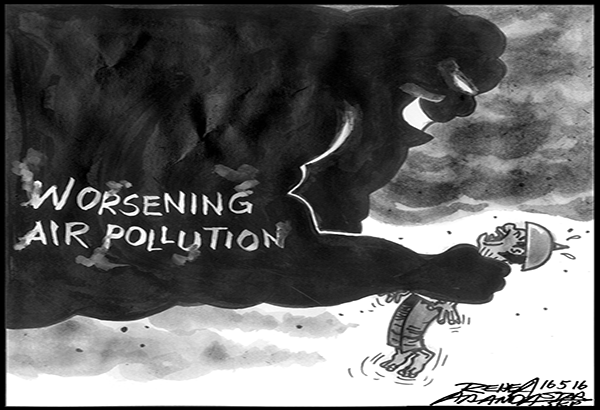EDITORIAL – The cost of pollution
May 17, 2016 at 17:32
EDITORIAL – The cost of pollution
(The Philippine Star) | Updated May 16, 2016 – 12:00am

Public dissatisfaction over the acute inadequacy of mass transportation facilities and transport-related services particularly in Metro Manila is seen to be among the reasons for the rejection of President Aquino’s anointed successor.
Now here’s another reminder to the incoming administration about the need to give priority to efficient mass transportation: a study conducted by the World Health Organization showed that 98 percent of people living in low- and middle-income countries are exposed to air pollution levels way above limits set by the WHO.
The Philippines, classified as a lower middle income nation, had particulate matter levels measured from 2008 to 2013 that were more than double the WHO-set limits, according to the organization’s 3rd Global Urban Ambient Air Pollution Database released last week.
Much of the air pollution has been attributed to vehicular and industrial emissions, with people in poor countries the worst hit. The WHO warned that poor urban air quality raised the risks of stroke, heart disease, lung cancer, and chronic and acute respiratory illnesses including asthma.
With the government expanding the coverage of PhilHealth, the impact of poor air quality on public health is going to be felt by taxpayers. Higher health risks mean bigger spending for public health care, which is inadequate enough in developing countries.
The WHO database on urban air quality has expanded over the years and now covers 3,000 cities in 103 countries. The study emphasized the need for speedy action to curb air pollution. Poor and rich countries alike suffer from smog.
Several advanced economies that now rank high in terms of air quality also used to be heavily polluted due to industrialization, proving that cleaning up the air is possible. Many of them have expressed willingness to share their experience with cities in developing nations in curbing air pollution.
Apart from learning from others, countries such as the Philippines can tap development aid for the substantial initial investment needed for green fuel and technology. Multilateral lenders have expressed readiness to provide financing for improving air quality in mega-cities. There’s a lot of help available in cleaning up the air we breathe. What is needed is political will and efficient implementation.
Source: www.philstar.com/opinion

















